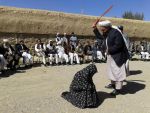Islamic law, or the Shariah, is held to comprise the specific rulings intended by Allah for all of mankind in all times and places and delivered through Islamic scriptures (namely, the Quran and hadith). Fiqh, or Islamic jurisprudence, comprises the legal and interpretive theories through which these rulings are derived from the Quran and hadith. Norms observed and prescribed by Muhammad in these scriptures are, as a rule, taken literally and considered binding. To intentionally defy any part of Islamic law is to defy God's will, and thus to recant one's faith. Islamic law covers and immense array of topics, regulating everything from bathroom etiquette, criminal law, bedroom conduct, and imperial policy to etiquette with books, restrictions on speech, restrictions on diet, and economy. As nearly all of Islamic law derives from the hadith rather than the Quran, historians have questioned whether much of it can be historically attributed to Muhammad in actual fact. Nonetheless, the Shariah serves as a foundation, at times comprehensively and other times nominally, for numerous Muslim-majority nations. Where Muslims are not governed by Islamic law, they are obligated to conduct their own lives in accordance with it, on penalty of torturous punishment in the hereafter, alongside unbelievers.
Theory
For all their prescriptive content, Islamic scriptures do not themselves contain a formal theory of law. Much as Christian doctrine has been pieced together by competing sects based on different formulas for reading scripture, Islamic law is generated only after Islamic scriptures are passed through the different interpretive apparatuses of the various schools of Islamic law. For all there differences, there is much that the four major Sunni schools of law, or madhhabs agree on: Muslims must pray facing the Ka'bah in Mecca, apostates must be executed, and cousin marriage is permissible. Broadly speaking, the four schools agree where there is explicit instruction on a legal matter in scripture deemed authentic, and differ where there isn't.
Islamic law, or the Shariah, is held to comprise the specific rulings intended by Allah for all of mankind in all times and places and delivered through Islamic scriptures (namely, the Quran and hadith). Norms observed and prescribed by Muhammad in these scriptures are, as a rule, taken literally and considered binding. Islamic law covers and immense array of topics, regulating everything from bathroom etiquette, criminal law, bedroom conduct, and imperial policy to etiquette with books, restrictions on speech, restrictions on diet, and economy.
Islamic jurisprudence, or Fiqh (فقه), is the activity Islamic jurists engage in as they elaborate the Shari'ah, or "Islamic law"/"God's Law", based directly on the Qur'an and Muhammad's Sunnah or "way", as compiled in the hadiths. Fiqh can be described as "the human understanding of the divine laws of God as revealed to Muhammad". In this sense, the Shariah is an ideal body of laws which fiqh only ever approximates, albeit satisfactorily in the eyes of jurists. The usage of the two words in common and even technical parlance overlaps.
A Madh'hab (مذهب) is a school of Islamic law or fiqh (Islamic jurisprudence). Within Sunni Islam there are four mainstream schools of thought, which are accepted by one another, and the Shi'ite school of fiqh which (according to a fatwa by Al-Azhar, the most respected authority in Sunni Islam) is also now accepted by some Sunnis as a legitimate fifth school of Islamic Law. The five major schools of Islamic law agree on many things, including the death sentence for apostates.
The Caliph (خليفة; khalīfah) is the head of state in a Caliphate, and the title for the leader of the Islamic Ummah (body of Muslim believers) who serves as the successor to Muhammad, the founder of Islam, in all matters of political and religious decision making. The word of the caliph is, however, only legally and not theologically binding upon members of the Muslim ummah who consider him legitimate. In this sense, it is Ijma (legal concensus) which is the proper Islamic analog of the Catholic pope, rather than the Caliph.
Other articles in this section
Women
Women are legally disadvantaged by Islamic law in several in several domains of life. Particularly, women are disadvantaged in matters of sexual, domestic, legal, financial, sartorial, and physical autonomy. According to Islamic legal theory, while not all of Islamic law necessarily has a perceptibly rational basis, legal restrictions on women may be due to their intellectual deficiency, which was pronounced by Muhammad and is recorded in Sahih Bukhari.
Child marriage and sexual activity between adults and children are sanctioned by Islamic law and were practiced by Muhammad and his companions. The schools of Islamic jurisprudence agreed that a father could contract his virgin minor daughter in marriage. Consummation was to occur when the family considered the child physically ready (no consideration was given to mental anguish). They supported their views variously using Muhammad's marriage to Aisha, the example of his companions, and their understanding of the Quran. In many modern Muslim countries a minimum age of marriage has been introduced or raised in recent decades.
The Mahr (مهر) is a contract fee paid for by the groom to the bride in an Islamic marriage (see The Meaning of Nikah). Its purpose within Islamic law, as shown through the Islamic texts themselves and the rulings of fiqh, is to compensate the woman for the privilege of consummating the marriage through sexual intercourse with her. The mahr is an obligatory part of Islamic law. In the abscence of a mahr, the marriage is not valid.
The traditional view of most Islamic scholars, past and present, prohibits free-mixing between men and women. Modern scholars and activists often posit that free-mixing is actually allowed in Islam, however their assertions on the matter usually lack the well-attested scriptural citations of the Islamic tradition that are marshaled by traditionalist scholars.
Wife-beating is instructed by the Qur'an and the Hadiths, and has been an accepted part of Islam law since its inception. Quran 4:34 states that men are in charge of women and that husbands may, among other things, beat their wives in some circumstances. Muhammad seems to have disapproved of severe beatings, but with this caveat reaffirmed the command of wife-beating in his farewell sermon, and himself once struck one of his wives painfully in the chest. Three of the four Rightly-Guided Caliphs are also reported to have slapped or beaten women, sometimes in Muhammad's presence. Because of its many endorsements within Islamic scripture, wife-beating is permitted by the majority of Muslim scholars and leaders (though in its mildest form is limited, somewhat nonsensically, to tapping with a small stick). This has led to domestic violence being permitted under law in several Islamic states or being largely ignored by the authorities.
Slavery, while no longer permitted in the modern context by most scholars, was a major theme of Islamic jurisprudence. The Quran permits sexual intercourse with those women "whom your right hands possess", and Caliphs from the Umayyads to the Ottomans enjoyed harems full of female concubines, attended by male eunuch (castrated) slaves.
Other articles in this section
Non-Muslims
Those non-Muslims permitted to live under the Islamic regime (namely, Jews, Christians, and Zoroastrians; i.e. 'Dhimmis') were subjected to unique disadvantages in matters of sexual, domestic, legal, financial, sartorial, physical, communal, and religious autonomy. While this subjugation is comparable - albeit in each specific account different - from the legal disadvantages imposed upon women under Islamic law, the rationale is fundamentally different. Though the Quran decries non-Muslims as being, among other things, 'deaf, dumb, blind'[1], 'evil'[2], 'like cattle'[3], 'perverse'[4], and 'without intelligence'[5], any supposed characterological traits are not the underlying reason for their subjugation, as might be thought to be case for the subjugation of women. The reason for the subjugation of non-Muslims living in the Islamic state is because they have the potential to convert to Islam. This Dhimma legal framework is not in force in modern Muslim states today as civil law is considered to have rendered it inapplicable.
The Quran and other Islamic sources prohibit certain degrees of relationship with non-Muslims, including with some of the "People of the Book". Its stance appears to have evolved over time at various stages of Muhammad's prophetic career, occurring in a context when the believers had been driven out from Mecca and there was a degree of enmity between them, as recorded in such verses as Quran 60:1. Some contemporary views emphasize contextual issues and use particular verses and examples from Muhammad's life to argue that friendship with non-Muslims is permitted in most circumstances.
The word Dhimma in modern parlance refers to the non-Muslim persons permitted to live under the Islamic regime (The Caliphate), namely those of Abrahamic faiths, as well as the system of financial, legal, and social subjugation that must be brought to bear over them so as to bring about their humiliation, as instructed by the Quran. Included in this system are the practices of Zunar (yellow-badge practices) and Jizyah (non-Muslim tax).
In Islamic terminology, a kāfir is a disbeliever, or someone who rejects or does not believe in Allah as the one and only God and Muhammad as the final messenger of Allah. In the context of Islamic scriptures, "kafir" is the broadest, all encompassing category of non-Muslim, which includes all other sub-categories, such as mushriqun, or polytheists, dahriyah, or those who deny the existence of any gods outright, as well as those who would today identify as agnostics or who are simply ignorant of religious figments.
Traditional Islamic jurists generally dichotomized the world into the Dar al-Harb, or Abode of War, and the Dar al-Islam, or Abode of Islam. Not recognizing anything but a perpetual state of warfare, save occasionally and tactically permitted temporary treaties, with all non-Muslim political entitles, Islamic jurists tended to legislate the Muslims should operate under war-time norms whenever they entered non-Muslim lands. This could go so far as to mean that theft, slave-raiding, and, according to some, even rape was permitted in non-Muslim lands, given the assumed perpetual state of war. It is on the basis of this dichotomy that some Islamic jurists today permit Muslims to collect interest from unbelievers in Western countries, by construing it as a form of legal theft.
Other articles in this section
Crime and punishment
Islamic scripture explicitly lists a number of particular punishments, most corporal, for the violation of the various rules it contains. The crimes for which scripture provides its own punishments tend to be those which are considered the most severe. Advocacy against these explicit scriptural injunctions is itself considered an act of apostasy, and thus traditionally merits the death penalty, as outlined in scripture. Beyond the well-known prohibitions on and punishments for sexual activity, the practice of free speech, and drinking alcohol, Islamic law traditionally also outlawed a great many forms of recreation, such as music and games that involved chance. In many cases, the particular prohibition is not clear - the most eminent example of this is, perhaps, the prohibition on Riba, as the precise meaning of the 7th century Arabian financial concept has long been lost to history.
According to Islamic law, it is a criminal offense to speak ill of Islam, its Prophet, and its holy Scriptures (Qur'an and Hadith). Blasphemy is punishable by death. Sufficiently unorthodox perspectives constitute blasphemy just as well as only partially orthodox perspectives (that is, those perspectives that affirm some tenants of blasphemy while denying others).
The four Sunni schools of jurisprudence all agree that practicing homosexuality is an egregious crime that earns an especially harsh punishment, although the schools vary regarding what exactly this punishment should be. Punishments range from execution by beheading, execution by stoning, execution by being thrown off a tall building, and imprisonment until death.
Islamic law does not punish the murder of those who warrant execution (such as blasphemers, apostates, and those who in some manner 'spread mischief in the Earth') and differentiates between the murder of a Muslim, which merits the death penalty, and the murder of a non-Muslim, which only merits the payment of blood-money. This ruling is outlined in the Quran and, in Sahih Bukhari, Muhammad is repeatedly recorded as saying "no Muslim should be killed in Qisas (legal retribution) for killing a Kafir (disbeliever)".
Intoxicants (الخمر al‐khamr) such as alcohol, marijuana etc. and recreational games of chance, such as board games (especially chess), card games and other forms of gambling are forbidden under Islamic law.
Other articles in this section
Jihad
Jihad, which literally means struggle, refers in Islamic law exclusively to military activity intended to spread and preserve the Islamic empire. Islamic literature does, however, often avoid this terminological use in order to use it in its literal sense. In this usage, the word Jihad is sometimes interpreted in terms of the personal, spiritual internal struggle one must at times engage in against oneself. This alternative, metaphorical usage of the word Jihad does not, however, have any legal implications. There are also rules set out for how to conduct Jihad. On the one hand, wildlife, innocents, and enemies should not be needlessly maimed. On the other, scholars of the expansionist-abrogationist paradigm held that aggressive warfare must be conducted to expand the abodes of Islam. Those who refuse to convert or submit to financial, social, legal, and various other forms of subjugation, be they innocents or combatants, must either be executed or enslaved (this includes sexually, in the case of women and girls). Historically, scholars outside of the imperial centres, as well as Islamic modernists and many academic scholars today see a much less aggressive picture in the Quran itself.
Jihad has been a central imperative in Islamic law throughout history and remains one today. Although the medieval doctrine of global religious and imperial conquest has proven controversial in recent times, particularly when groups have attempted to implement it, the basic contours of the doctrine have remained static since the early Islamic caliphates. On the other hand, many academic and Islamic modernist scholars have questioned the medieval interpretations and their extensive use of the doctrine of abrogation, arguing that from a Quranic basis fighting and jihad are for defensive and pre-emptive purposes. Academic scholars also have much to say about the earliest expedition literature and the ideology at play in early interpretations.
The practice of inviting non-Muslim nations to join Islam or pay the Jizyah prior to engaging in offensive Jihad was first initiated by the Prophet Muhammad according to tradition. His example was then followed by the Rightly-Guided Caliphs and the leaders of Islamic empires, codified within the Islamic Shari'ah. Where radical Islamists have today tried to emulate Muhammad and implement this well-established practice, they have generally been faced with widespread criticism.
There are many hadith narrations and Qur'anic verses forbidding suicide. There are also a small number of hadiths which have been used in Islamic law to sanction attacks on the enemy when death at their hands is a near certainty. This has been taken further by numerous Islamic jurists in recent decades to sanction in certain contexts suicide bombing where death occurs at the attacker's own hands. These interpretations have, however, been heavily challenged in fatwas backed by thousands of scholars, and surveys show that increasing majorities of Muslim populations around the world disapprove of such attacks.
"Fard" means Compulsory. Jihad has generally been considered an individual duty at times of great need and otherwise a responsibility that can be fulfilled by a portion of the community. While modern voices differentiate between a personal or greater Jihad and a military or lesser Jihad, such a dichotomy is not found in classical and especially early Islamic literature, and finds no endorsement in Islamic scripture, which refers to Jihad overwhelmingly, and some argue exclusively, as a doctrine of military conquest, with the reference to internal struggle being a metaphorical usage.
Other articles in this section
Ritual
A great part of the body of Islamic law regulates the particulars of ritual practices ranging everything from precisely how one should twiddle one's index finger during the daily prayers to how the the throats of cattle should be split and drained dry of blood during ritual sacrifice. Whereas scripture provides usually clear outlines on the basic workings of rituals, jurist differ endlessly in the details. The great majority of ritual law regards benign practices of the finger-twiddling variety which, despite being a potential and sometimes actual source of social discord, have generally become topics of lesser concern among the wider Muslim population. Ritual laws regarding the large-scale sacrifice of hundreds of millions of animals to Allah, on the other hand, have attracted growing international attention. Similarly troubling have been the pilgrimage rituals conducted at Mecca which, when practiced by millions of persons all at once, have repeatedly resulted in hundreds of deaths by stampede and contagion. While some of these challenges such as those with pilgrimage rituals, Islamic jurists contend, can be overcome through logistical and architectural innovation, other, often moral, challenges, such as those face by animal sacrifice in the face of growing concern for animal rights, have beeen cause for lesser optimism.
Eid Al-Adha (عيد الأضحى, "the festival of sacrifice") is the biggest Islamic holiday, in which Muslims ritually sacrifice animals (usually sheep) in commemoration of Abraham's attempted child sacrifice of Isma'il (Ishmael). Of the two Islamic Eid festivals (the other being Eid al-Fitr, celebrating the end Ramadan), Eid al-Adha is the holier one. Eid al-Adha occurs on the 10th day of Dhu al-Hijjah, the final month of the Islamic Lunar Calendar, and lasts four days.
Qurban means "sacrifice" in Arabic. Islamic scriptures (the Qur'an and Hadith) recount at least two close instances of human sacrifice which were averted at last second and contemporary Muslims continue to engage in yearly animal sacrifice on عيد الأضحى "Eid Al-Adha", the Eid of the Sacrifice.
The Hajj (حج) is the annual Islamic pilgrimage to Mecca. It is an obligatory duty (fard الفرض) for physically and financially capable Muslims, and constitutes one of the Five Pillars of Islam. The pilgrimage takes place on the 12th month of the Islamic calendar, between the 7th and 13th day of Dhu al-Hijjah. Those who fail, despite their capability, to complete the Hajj at least once during their life times may have others complete it on their behalf, so as to avoid torment in the hereafter.
Prophet Muhammad's hijra, or flight, from Mecca to Medina in 622 AD marks the beginning of the Islamic lunar calendar. Thus, the Islamic calendar dates have the suffix AH. The Islamic lunar year is between 10 and 12 days shorter than the "Western" or "Christian" Gregorian solar year, and so cycles through the seasons. The Islamic calendar is used in conjunction with the Gregorian calendar in some parts of the Muslim world, and is almost always referenced in relation to Islamic rituals (like the Hajj) and festivals (like Eid al-Adha), as it is with the Islamic calendar that these event correlate.
Other articles in this section
Other topics in Islamic law
Other articles in this section
References
























